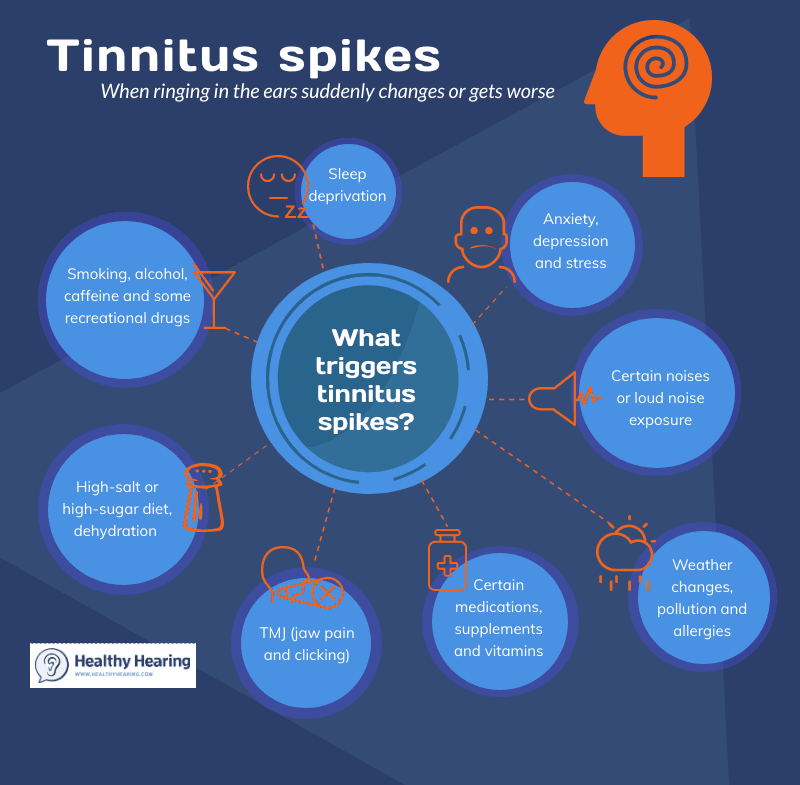|
www.HealthyHearing.com |
Preventing tinnitus relapse: Strategies for long-term relief'Habituation alone will not protect you from difficult moments'
Contributed by Glenn Schweitzer One of the most difficult problems many tinnitus sufferers will eventually face is dealing with sudden spikes or difficult moments after they have habituated and found relief. 
While habituation can restore your quality of life and provide lasting relief, it’s not a cure for tinnitus. You never know when you might get hit with a loud sound you weren’t expecting, or a medication side effect, or an injury that causes your tinnitus to spike or change in some way. Without the right tools and strategies to manage these difficult moments, the vicious cycle of fight or flight can suddenly re-emerge, and it can feel like you are starting all over again. Tinnitus relapses are far more common than people realize, but you can learn to protect yourself. Who is at risk of a tinnitus relapse?When I first started writing about tinnitus, I was unaware of the problem of habituation relapse because I hadn’t experienced it myself and it never came up in my research. Even to this day, I don’t hear very many of my colleagues discussing the problem, let alone strategies to address it. It wasn’t until I started to work one-on-one with other tinnitus sufferers that I began to understand just how common it was for patients to fall out of habituation, and how important a long-term coping strategy was going to be if I wanted to help people to achieve long-term relief. I have found that those most at risk of habituation relapse are people who have habituated naturally, over time, without utilizing any specific strategy or tools. This group is followed closely by people who habituated with limited tools and understanding. (For example: Patients who seek tinnitus retraining therapy and are given tinnitus maskers, but never receive ongoing counseling or cognitive behavioral therapy). But the reality is that a habituation relapse can happen to anyone, for many different reasons. And if you have habituated but don’t have an understanding of the habituation relapse problem, or effective tools and strategies to prevent a relapse in the future, you are actively at risk. too. How a habituation relapse occursLet’s start by examining the case of a person who has habituated naturally. Given enough time, most tinnitus sufferers will eventually habituate naturally to some extent, even if they do nothing to help themselves. In some cases, it can take years, but most people will eventually find at least some degree of relief. This of course isn’t true for every patient. Not everyone will habituate naturally over time. But I truly believe that every tinnitus sufferer has the capacity to achieve habituation by actively working to habituate. I’ve seen far too many people find relief from life-ruining levels of tinnitus to ever believe otherwise. I also believe that you can get to a much greater level of habituation and relief by actively working to habituate than you could ever hope to achieve naturally. But it is true that most people will habituate eventually, even if they do nothing. Habituation alone will not protect you from difficult momentsHere’s the problem, and it’s a big one.
As the suffering returns, not only are they not going to know what to do to feel better, they won’t know how they found relief before, the first time around. They may have felt like they had finally accepted their tinnitus, and that’s why it wasn’t bothering them anymore. But acceptance wasn’t the strategy that gave them relief, it was the emotion they felt when it stopped bothering them. When faced with a sudden and difficult spike, they won’t be able to accept it at all. They will feel powerless to cope, and the vicious cycle can suddenly start all over again. In some ways, a relapse is more challenging than the original suffering because you can remember how bad it was before, and you’ve now seen how good life can get on the other side. To feel like it’s all been taken away from you is difficult to reconcile. People often feel like the nightmare is starting all over again, which only causes further anxiety and ignites the vicious cycle of fight or flight even faster. Why do habituation relapses occur?Powerlessness is the root emotion at the heart of every difficult case of tinnitus. All of the negative emotional impacts of tinnitus – the anxiety, fear, despair, hopelessness – come from feeling utterly powerless to find any kind of relief in the face of a confusing and overwhelmingly difficult health problem that is slowly deteriorating your quality of life. 
relapses, you may feel powerless all over again. Powerlessness is also the emotion at the start of every habituation relapse, and the reason that habituation relapses occur. Everyone experiences emotionally and psychologically challenging circumstances throughout their lives, but any obstacle can be overcome if you have the right tools and knowledge. It’s when you feel powerless to do anything at all to improve your situation that things start to fall apart. If your tinnitus spikes or changes and you do not have a plan or effective tools at the ready, you will likely start to feel powerless all over again. And the anxiety will start to build, sometimes slowly, sometimes all at once. Preventing a tinnitus relapse: 3 key strategiesIn my opinion, there are three primary strategies that offer the best possible defense against tinnitus habituation relapse.
1. Create an emergency coping planThe best strategy is to have an emergency plan in place to boost your defenses as soon as you experience the spike. You want to put out the fire right when it starts, rather than trying to cope when the flames are overwhelming you. Choose at least three to five coping tools that have served you well, especially the simple tools like sound masking that helped you early on in your journey. Write them all down on a piece of paper and store it somewhere easily accessible. Things like masking, meditation, breathing techniques, relaxation techniques, and deliberate distractions are all helpful here. The faster you can put your plan into action, the easier time you'll have managing the spike and the greater the likelihood that you will remain habituated when the spike has subsided. Things that can get in the wayIt may sound simple, but I have found that many people struggle with this strategy for two reasons. First, to have to use a basic tool like sound masking again after not needing it for a while can feel like you are admitting defeat and starting all over again. You aren’t defeated, and you aren’t starting over again, yet many people report feeling this way. It’s also likely that something has happened in your personal life that caused your tinnitus to spike, and you may have your hands full dealing with the crisis or emergency that brought it on. In most of these situations, the spike won’t be torture right away. The negative emotional impact often creeps back in, bit by bit. At first, you will probably be able to ignore it entirely, even if it’s slowly starting to bother you more and more. But this is avoidance behavior, and problems always get worse when we avoid them. You don’t want to avoid dealing with a future spike, even for a second. The quicker you can put your coping plan into action, the better your chances of remaining habituated. 2. Increasing "speed to tools"Increasing your coping response time, or speed to tools, is an important meta-skill that leads to the greatest improvements in coping outcomes. The goal is simple: You want to get better at noticing when a negative emotional reaction is starting, and to intervene with a coping action as quickly as possible. Negative emotional responses happen fast, but you don’t go from 0-100% intensity instantaneously. There is always a period of time between stimulus and reaction where you can intervene and halt the escalation process. The problem is that it’s hard to catch yourself when the anxiety is first starting. It’s kind of like falling into river with a strong current. By the time most people realize what’s happening, they’re halfway down the river and starting to drown. The anxiety is in full swing. But if you can train yourself to notice the very first moment, and to react with a coping action right away you can short-circuit the reaction and prevent the escalation entirely. 'Tinnitus response training' to speed up your responseThe most effective way to increase your speed to tools is through repetition and practice. The more you try to catch yourself at the first moment you are starting to react negatively to the sound, the easier it will become. But you can get a lot better results with a strategy I call tinnitus response training. All you have to do is use the same repeatable coping routine as quickly as possible any time you start to react negatively to your tinnitus, regardless of how much it’s bothering you when you notice it.
It’s just like the idea behind basic training in the military, where you are made to endure very stressful situations over and over again. This way, when a crisis happens on the battlefield, your body already knows exactly what to do and will go through the motions automatically and without panic. The specific coping routine you implement here can vary, but ideally you want to pick at least one tool that helps you to relax immediately and one to address negative thoughts. With enough repetitions over time, the coping routine will start to become a conditioned response that will happen immediately and automatically anytime your tinnitus starts to bother you. Fight or flight may be an involuntary reaction to your tinnitus, but with this strategy, you can program a kind of defense mechanism into your nervous system to automatically kick in and protect you from habituation relapse. 3. Confidence: How to never feel powerless againTo remain habituated over a lifetime, you need more than the right skills and tools, and the ability to react quickly. You also need to have confidence in your ability to use the tools and techniques effectively. Confidence in your ability to cope is the antidote to feeling powerless – it is in fact the opposite of powerlessness. Without it, habituation relapse is all but inevitable. I’ll even take it a step further: the speed at which you can become distracted from your tinnitus when it has your attention (whether it’s bothering you or not in that moment) is directly correlated with your confidence in your ability to cope effectively. So how can you improve your confidence? In my opinion, confidence in your ability to cope primarily comes from two places: successfully facing your tinnitus-related fears and overcoming spikes, setbacks, and other difficult tinnitus-related moments. Facing fears in a controlled environment
build confidence before relapse occurs. One of the most simple and direct methods to improve your coping confidence is to face your tinnitus-related fears directly in a controlled environment. You can approach this in a few different ways. The first is to simply go and do the things that you have been avoiding out of fear that your tinnitus will spike. With a little bit of planning, you can minimize the risk of negative consequences and you can plan for every possible outcome. Every time you push yourself to do something you’ve been afraid to try, you are building confidence. If things go well, you will feel more confident to do more of the things you have been avoiding. But even when things go wrong, and you have to deal with negative outcomes, you are still building confidence, because you are overcoming challenges and living the life you want to live, despite the tinnitus. The other approach has to do with the tinnitus-focused meditation techniques which are at the center of my habituation strategy. This involves focusing on the sound of your tinnitus during meditation, which can be very challenging when you’re first starting out. When working with new patients, I try to make this as easy as possible by using guided meditations that feature background noise to drown out some of the tinnitus volume and highly sedating brainwave entrainment audio technology to help them get into a deeper meditative state. But as my client’s make progress, I progressively increase the difficulty level, ultimately leading up to tinnitus-focused meditation in total silence. There is nothing that builds coping confidence more than knowing that you can find a deep sense of peace and relaxation in total silence on a day that your tinnitus is spiking, without needing any external tools or equipment. It is the highest level of coping confidence you can achieve (and it will also help you to feel more comfortable in quiet environments when not actively coping.) Overcoming challengesThe process of habituation is never linear. Spikes and setbacks are an unavoidable part of the process, and it often feels like taking three steps forward and two steps back, over and over again.
It makes for a rough journey, but if you approach it with the right mindset, it also allows you to build the confidence you need to remain habituated over the long term. Every time you have a difficult moment and think, “This is horrible! How am I going to live like this,” only to get through it and calm back down on the other side, you are left with a little more confidence than you had before. And when you encounter the same problem again, you will remember how you were able to handle it the last time. Over time, this confidence builds and multiplies, until one day, when the spike hits, there’s no panic at all, just a calm and swift response with the appropriate tools to address the problem at hand. Practicing deliberate coping in a wide variety of difficult situations is key. Final thoughtsUntil we have a reliable cure for tinnitus, habituation offers our best and most complete chance at relief. Your tinnitus does not need to go away for you to be every bit as happy as you were before it started. Habituation can completely restore your quality of life. And while difficult moments down the road may be inevitable, you can learn to protect yourself effectively and remain habituated through whatever comes your way. Glenn Schweitzer
|
Featured clinics near me
Hearing Health Solutions from Ohio ENT - Columbus
974 Bethel Rd Ste B
Columbus, OH 43214
Earzlink Hearing Care - Reynoldsburg
7668 Slate Ridge Blvd
Reynoldsburg, OH 43068

Find a clinic
We have more hearing clinic reviews than any other site!


 .
. Glenn Schweitzer is an entrepreneur, blogger, and the author of Rewiring Tinnitus and Mind over Meniere’s. He is passionate about helping others who suffer from tinnitus and vestibular disorders and volunteers as an Ambassador Board Member for the Vestibular Disorders Association (VEDA). Through his blogs, he continues to raise awareness for tinnitus, Meniere’s disease, and other vestibular disorders, spreading his message of hope to those in need.
Glenn Schweitzer is an entrepreneur, blogger, and the author of Rewiring Tinnitus and Mind over Meniere’s. He is passionate about helping others who suffer from tinnitus and vestibular disorders and volunteers as an Ambassador Board Member for the Vestibular Disorders Association (VEDA). Through his blogs, he continues to raise awareness for tinnitus, Meniere’s disease, and other vestibular disorders, spreading his message of hope to those in need.